How is Olive Oil Made? From Bitter Olives to Beloved Ingredient
The Story at a Glance:
- How is Olive Oil Formed?
- Understanding the Difference Between Regular Olive Oil and Extra Virgin Olive Oil
- How is Greek Olive Oil Made?
- How is Extra Virgin Olive Oil Made?
- How to Make Extra Virgin Olive Oil: A Step-by-Step Guide
- Is Olive Oil Healthy?
- Is Olive Oil Made 100% from Olives?
Olive oil, a staple in Mediterranean cuisine and a core component of healthy diets worldwide, has captivated palates for centuries.
Its rich, buttery flavor and numerous potential health benefits have made this golden tonic a coveted ingredient.
But have you ever wondered how this luxurious liquid is transformed from bitter olives to the beloved oil we drizzle on our salads and sauté our vegetables in?
While the basic process of olive oil production remains consistent across different varieties, subtle variations in cultivation, harvesting, and processing techniques can significantly impact the final product's quality, taste, and nutritional value.
From the delicate, fruity flavor of Greek olive oil to the robust, peppery notes of extra virgin olive oil, the world is awash with a stunning array of varieties.
Each type, with its unique characteristics, offers distinct sensory pleasures and health-related benefits.
These nuances, often imperceptible to the untrained eye or palate, are what distinguish a high-quality extra virgin olive oil from a lesser grade.
To truly appreciate the subtleties of olive oil and harness its full potential, we’re taking a deep dive into the intricacies of its production process.
LET’S BREAK DOWN THE BASICS
How is Olive Oil Formed?
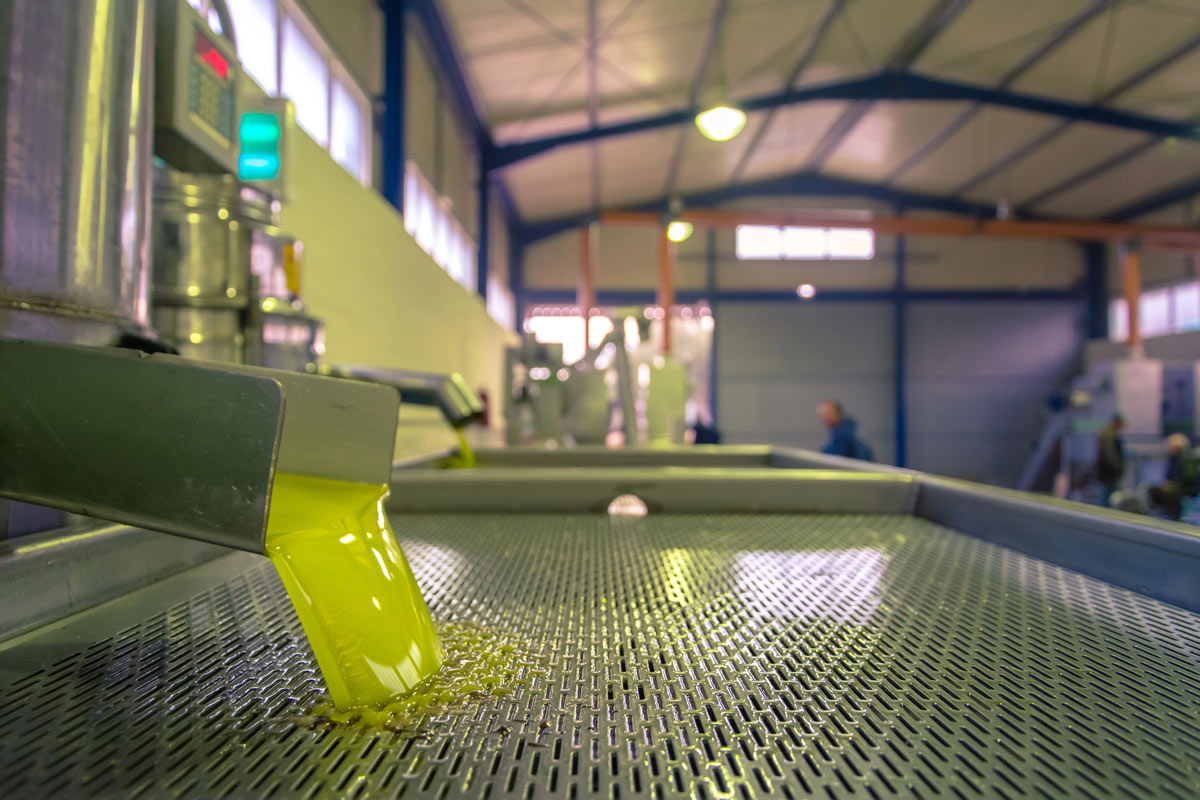
Olive oil is a liquid extremely beneficial fat, extracted from olives, the fruit of the Olea europaea tree.
To produce olive oil, ripe olives are harvested and then crushed into a paste.
This paste is mixed with water and subjected to a mechanical pressing process known as cold pressing.
This traditional method minimizes the use of heat, preserving the oil's delicate flavor profile and nutritional content.
The resulting mixture separates into three layers consisting of oil, water, and solid matter. The oil, being less dense than water, rises to the surface and is carefully extracted.
In Summary
- Olive oil is a liquid extremely beneficial fat extracted from olives, the fruit of the Olea europaea tree.
- It's a staple in Mediterranean cuisine and is renowned for its numerous health benefits.
- The production process involves harvesting ripe olives, crushing them into a paste, and extracting the oil through cold pressing.
- This traditional method minimizes the use of heat, preserving the oil's delicate flavor profile and nutritional content.
The Subtle Art of Olive Oil Production
UNDERSTANDING THE DIFFERENCE BETWEEN OLIVE OIL AND EXTRA VIRGIN OLIVE OIL
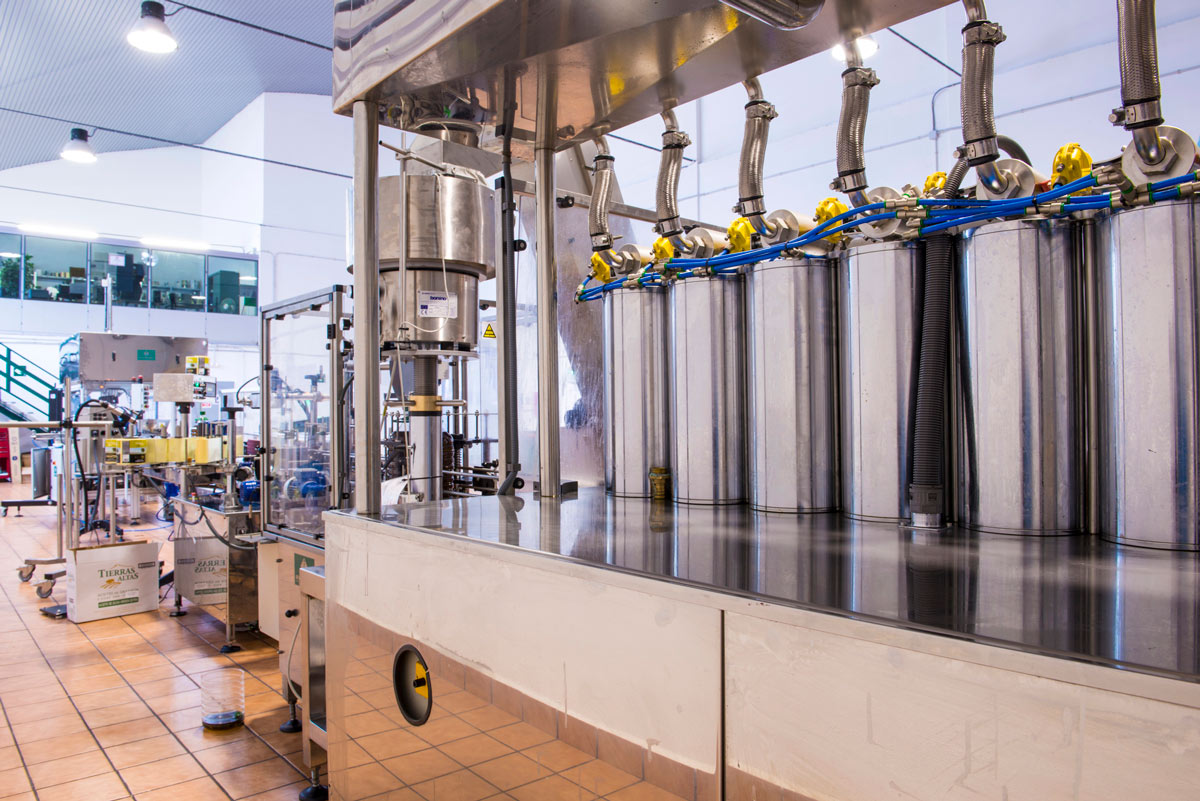
While the fundamental steps of making olive oil are pretty much the same for all types, the specific methods and the quality of the olives used can really impact the final product.
Greek olive oil production, for instance, often involves strong emphasis on the types of olives used, resulting in oils with distinct flavor profiles and nutritional benefits.
Unlike regular olive oil, which may undergo chemical processing, extra virgin olive oil undergoes distinct methods that preserve its natural flavor and high nutritional content.
How is Greek Olive Oil Made?
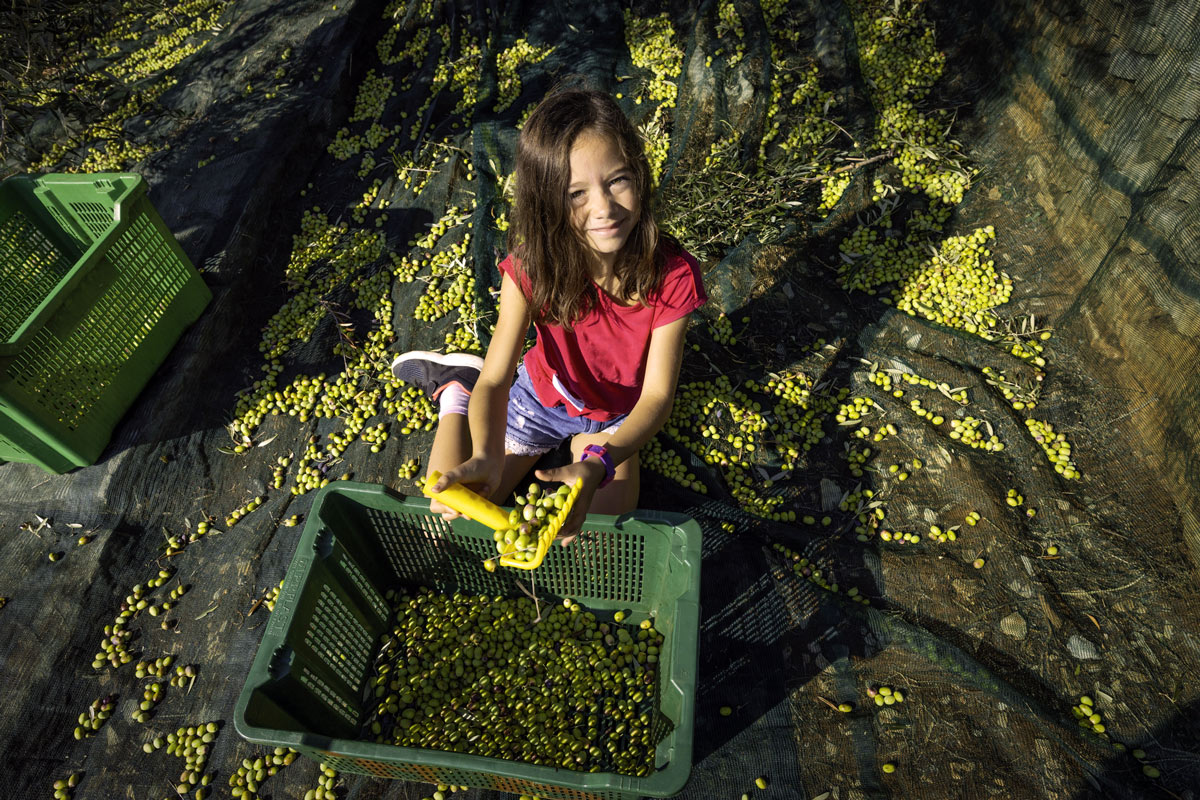
The process of making Greek olive oil is deeply rooted in centuries-old techniques, ensuring the preservation of the oil's unique flavor and aroma.
Similar to other olive oil production methods, Greek olive oil is made through a process involving harvesting, crushing, and pressing.
However, Greece boasts a diverse range of exceptional olive cultivars, each contributing to the unique characteristics of its olive oil.
Distinguishing Factors of Greek Olive Oil:

- Unique Ancient Local Varieties: Olive oils such as Olympia, Athinolia, Manaki, and Koroneiki are made from unique ancient local varieties. These oils are renowned for their exceptional organoleptic characteristics and extremely high natural concentrations of polyphenols and other antioxidants.
- Traditional Organic Cultivation Methods: These methods have been handed down from antiquity, rooted in the traditions and heritage bestowed by ancestors. This deep knowledge and experience are passed from father to son.
- Small Family Olive Estates: The olive trees are nurtured with love, passion, and the utmost dedication on small family estates. The olives and olive oil produced are primarily consumed by the families themselves, ensuring top quality.
- Climate and Soil: The Mediterranean climate, with its warm, dry summers and mild, wet winters, provides ideal conditions for olive tree growth. The diverse soil types across Greece further contribute to the variety of flavors in Greek olive oils.
- Harvesting: Greek olive growers often harvest their olives by hand, selecting only the ripest fruits. This meticulous approach ensures that the olives are harvested at their peak of flavor and nutritional content.
- Traditional Milling: In Greece, many olive mills still blend traditional methods, like stone milling, with modern science and technology. This gentle process helps preserve the delicate fragrance and flavor of the olives, prioritizing top quality over quantity. It’s noteworthy that over 85% of the olive oil produced annually in Greece is of the highest grade—Extra Virgin Olive Oil.
How is Extra Virgin Olive Oil Made?
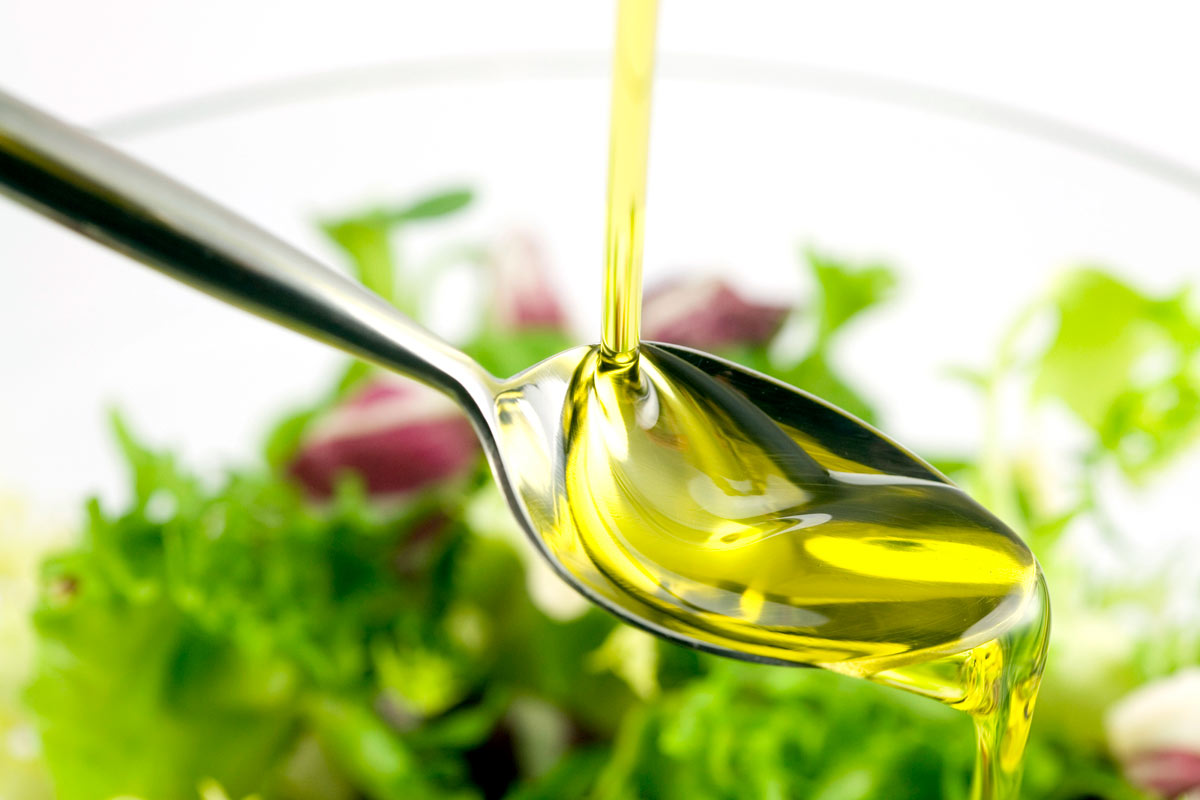
Extra virgin olive oil (EVOO) is the highest quality grade of olive oil, produced through a detailed and delicate process that prioritizes quality over quantity.
Unlike lower-grade olive oils, EVOO is obtained from the first cold pressing of olives, exclusively by mechanical means, without the use of heat or chemicals.
This gentle extraction method preserves the oil's flavor, aroma, and potential health benefits.
Key Factors that Differentiate EVOO from Lower-Grade Oils:
- Acidity Level: EVOO must have a free acidity level of less than 0.8%, ensuring a superior taste and longer shelf life.
- Sensory Attributes: Sensory Attributes: EVOO is characterized by its fruity, herbaceous, or peppery flavor profile, along with a distinct aroma and zero organoleptic defects.
- Polyphenol Content: EVOO is rich in polyphenols, powerful antioxidants that can offer numerous health benefits, including a reduced risk of heart disease and certain types of cancer.
- No Processing or Additives: During the production process, no processing, additives, artificial aromas, flavors, or ingredients are used or allowed, ensuring the purity and natural quality of the product.
In Summary
- The quality of olive oil depends on the production method and the quality of the olives used.
- Greek olive oil production is influenced by the unique climate, soil, and harvesting methods.
- Traditional milling techniques, like stone milling, combined with modern technologies, preserve the oil's delicate flavor and aroma.
- Extra virgin olive oil is the highest quality grade, produced through cold pressing.
- EVOO must have a free acidity level of less than 0.8%.
- Extra virgin olive oil is mainly obtained from the cold pressing of olives, preserving its flavor, aroma, and health benefits.
How to Make Extra Virgin Olive Oil
A STEP-BY-STEP GUIDE TO EVOO PRODUCTION
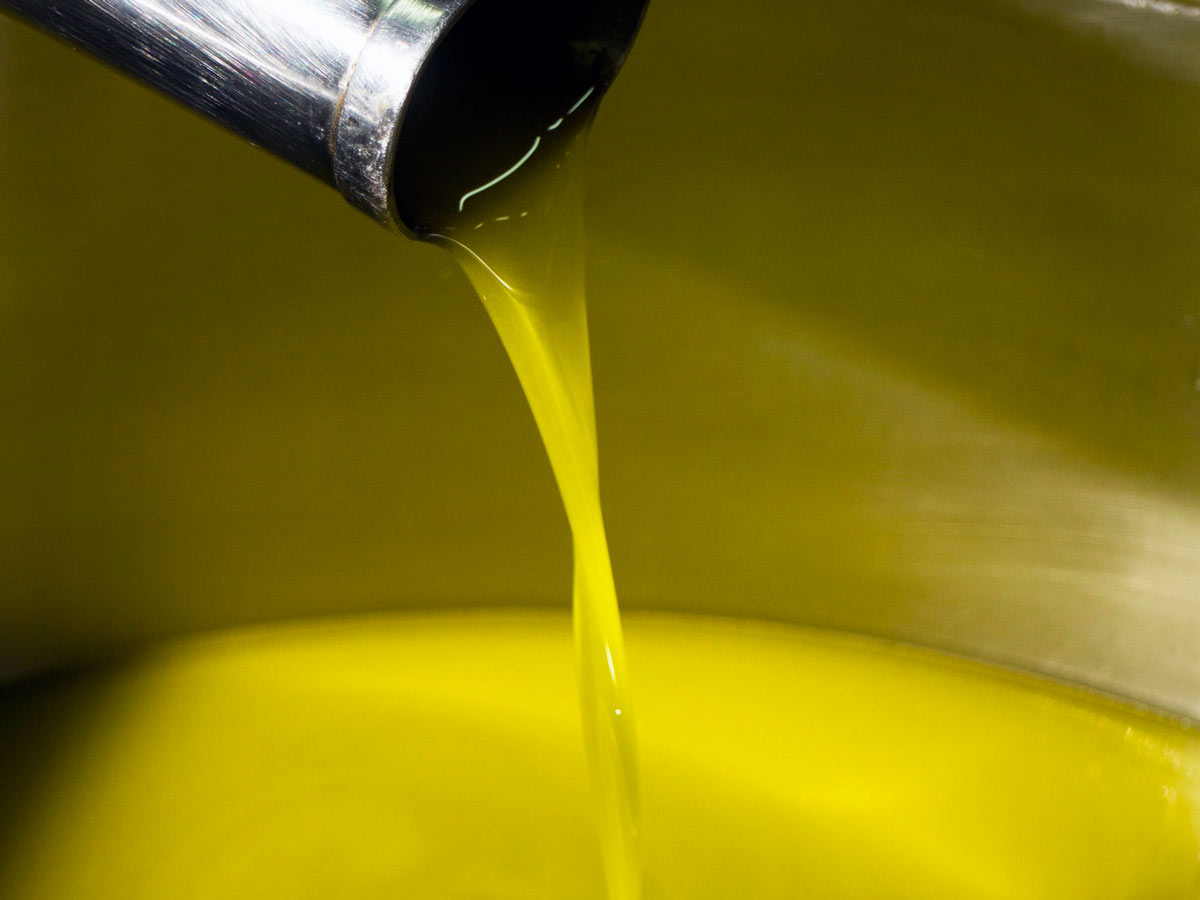
As we’ve established, not all olive oils are created equal.
While many commercial brands may be labeled as "extra virgin," their quality can vary significantly.
To truly reap the health benefits and culinary delights of olive oil, it is essential to seek out high-quality, extra virgin olive oil, particularly those rich in polyphenols.
Hypereleon, a brand committed to producing the finest extra virgin olive oil, exemplifies this pursuit of excellence.
By adhering to traditional methods and employing duteous techniques, Hypereleon ensures that its EVOO is rich in taste, color, aroma, and health-promoting compounds.
Here's How Hypereleon Ensures the Highest Quality EVOO:
WORLD-CLASS QUALITY AT EVERY STAGE OF THE PRODUCTION PROCESS
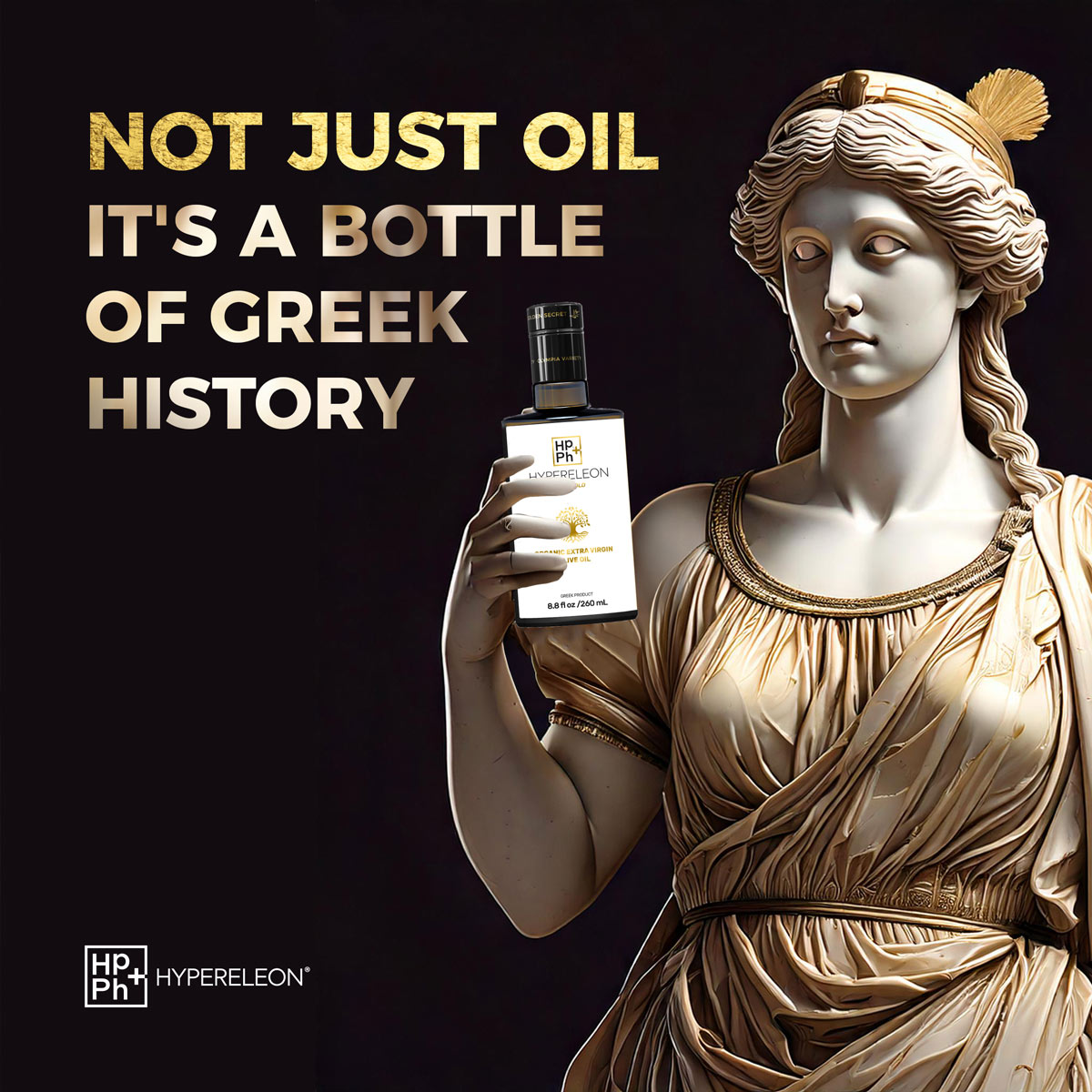
Cultivation
- Variety Selection: Hypereleon carefully selects olive cultivars renowned for their high polyphenol content. These varieties are prized for producing oils with exceptional flavor profiles and potential health benefits.
- Organic and Biodynamic Practices: HYPERELEON adheres strictly to organic and biodynamic farming methods, avoiding synthetic pesticides, herbicides, and fertilizers. This promotes healthier soil, greater biodiversity, and enhances the natural growth of olive trees. The result is olives with a higher nutritional value, enriched with more antioxidants and polyphenols. These practices and their benefits are verified by independent international certifying bodies and numerous globally recognized labs.
- Optimal Growing Conditions: HYPERELEON selects olive trees located at mid to high altitudes, which benefit from cooler temperatures and increased sunlight, enhancing flavor complexity and the concentration of beneficial compounds. The groves feature high natural drainage, advanced water management, and special subsoil composition, all contributing to the olives' quality. Adequate spacing between trees ensures better air circulation, reducing fungal disease risks and improving overall fruit quality.
Harvesting
- Early and Selective Harvesting: Olives are hand-picked very early and selectively according to the ripeness of each tree, when they have reached optimal levels of polyphenols among other valuable compounds.
- Immediate Processing: Prioritizing freshness and preventing oxidation, the harvested olives are swiftly transported to the mill within hours to preserve the delicate flavors and nutritional value of the oil.
Extraction
- Cold Pressing: Hypereleon employs traditional cold pressing techniques to extract the oil, solely by mechanical means. This gentle method involves gradually increasing pressure to release the oil from the fruit, without the use of heat, water, additives or chemical solvents.
- Optimal Paste Conditions: Ensuring the olive paste is protected from heat, air, light, and moisture throughout processing. Constant monitoring and meticulous care are applied to prevent oxidation, which can degrade the organoleptic qualities and destroy the natural antioxidants in the olive oil. This careful management preserves the integrity and health benefits of the oil.
Processing
- Zero Processing: This EVOO is unrefined, unbleached, unfiltered, and undeodorized to preserve its natural characteristics and antioxidants, ensuring the oil's purity and integrity without causing organoleptic defects.
- Rigorous Quality Control: HYPERELEON maintains the highest standards of quality control, conducting sensory analyses, chemical testing, and physical tests to ensure oil quality. The oil is also certified by numerous internationally recognized labs and independent certifying bodies.
Bottling and Storage
- Natural Sedimentation: After extraction, it is allowed to settle naturally in stainless steel tanks rather than being filtered. This process lets sediments separate slowly, preserving the oil's clarity, flavor, and high concentration of beneficial antioxidants and nutrients.
- UV-Protected Sophisticated Bottling: HYPERELEON is bottled in dark, UV-protected containers to guard against light-induced degradation and extend shelf life. The oil is also bottled using vacuum filling machines to eliminate air exposure, further protecting its quality.
- Temperature-Controlled Storage: The oil is stored in a cool, dark environment to prevent oxidation and deterioration before it is packaged and sold.
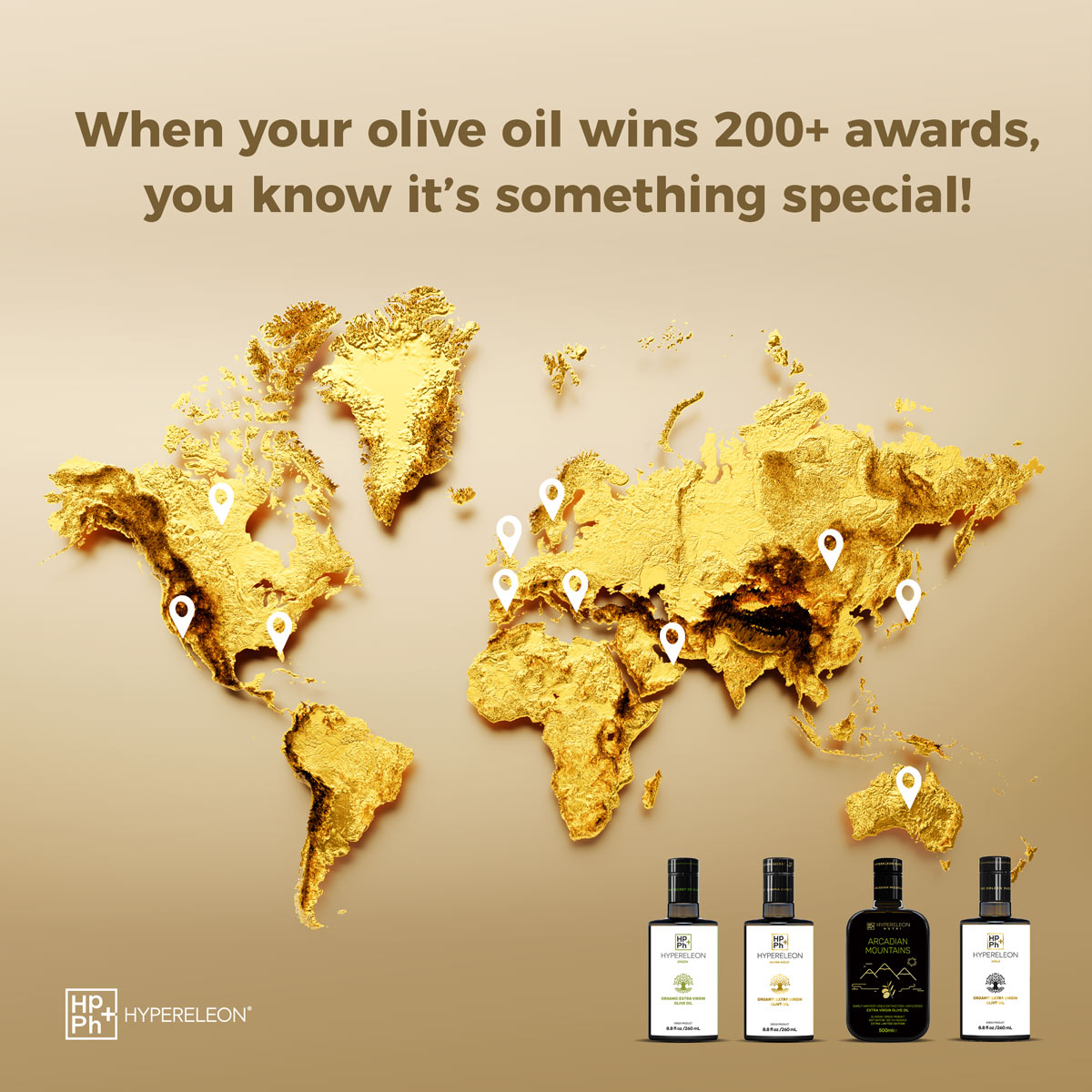
By adhering to these principles and prioritizing quality over quantity, Hypereleon produces exceptional EVOO, ensuring consumers can enjoy the full spectrum of flavors and potential health benefits that their extra virgin olive oil offers.
In Summary
- HYPERELEON combines traditional methods with modern science and rigorous quality control to produce ultra-premium extra virgin olive oil.
- The brand selects specific olive varieties and employs organic and biodynamic farming to enhance nutritional values and flavors, ensuring the preservation of high concentrations of polyphenols and other beneficial antioxidants.
- Olives are handpicked at optimal ripeness and cold-pressed immediately to preserve essential natural compounds.
- HYPERELEON's EVOO undergoes no processing, relying solely on mechanical cold extraction, backed by constant scientific monitoring and strict quality controls, along with multiple international certifications to guarantee exceptional quality and concentration of health-protective ingredients.
- The olive oil is stored in UV-protected containers in cool, dark, air-free environments to maintain its longevity and flavor integrity.
Is Olive Oil Healthy?
THE HEALTH HALO OF OLIVE OIL
With the amount of care and detail that goes into the production of olive oil, it’s no wonder countless individuals are eager to incorporate olive oil into their diets.
However, it’s important to be mindful of excessive intake.
While olive oil offers numerous potential health benefits, it's essential to consume it in moderation if you wish to reap the rewards.
The Potential Health Benefits of Olive Oil Include:
- Heart Health: Olive oil, particularly extra virgin olive oil, like that produced by Hypereleon, is rich in monounsaturated fatty acids, which can help lower bad cholesterol (LDL) while raising good cholesterol (HDL). This can lower the risk of heart disease.
- Antioxidant Power: EVOO contains powerful antioxidants, such as polyphenols, which may help protect cells from damage caused by free radicals.
- Anti-inflammatory Properties: Some studies suggest that olive oil may have anti-inflammatory effects, which could benefit conditions like arthritis.
- Potential Cognitive Benefits: Regular consumption of olive oil has been linked to a reduced risk of cognitive decline and Alzheimer's disease.
Is Olive Oil Made 100% from Olives?
A CLOSER LOOK AT OLIVE OIL PURITY
A common misconception is that all olive oil is purely derived from olives.
While high-quality extra virgin olive oil is indeed produced solely from olives, the olive oil market is unfortunately rife with adulteration.
The Problem of Adulteration
Adulteration involves the mixing of olive oil with cheaper oils, such as soybean, sunflower, or palm oil.
This practice is widespread and can significantly diminish the quality and health benefits of olive oil.
How to Identify Pure Olive Oil

- Check the Label: Look for certifications from reputable organizations like the International Olive Council (IOC). These certifications ensure that the oil meets specific quality standards.
- Sensory Evaluation: Taste, smell, and appearance can provide clues. High-quality olive oil should have a fruity aroma, a peppery taste, and a golden-green color.
- Purchase from Reputable Sources: Buy olive oil from trusted brands like Hypereleon or specialty stores that prioritize quality.
- Storage Matters: Once purchased, it’s essential to store your olive oil in a cool, dark place to preserve its flavor and nutritional value.
In Summary
- Olive oil, particularly extra virgin olive oil, is linked to various health benefits, including heart health, antioxidant protection, potential anti-inflammatory effects, and cognitive benefits.
- However, it's crucial to consume olive oil in moderation.
- Adulteration is a common issue in the olive oil industry, where cheaper oils are mixed with olive oil.
- To ensure purity, look for certifications from reputable organizations like the International Olive Council (IOC).
- Evaluate olive oil based on sensory attributes like fruity aroma, peppery taste, and golden-green color.
- Purchase olive oil from trusted brands like Hypereleon or specialty stores that prioritize quality.
- Store olive oil in a cool, dark place to preserve its flavor and nutritional value.
Conclusion
If you're seeking high-quality, flavorful, and health-enhancing olive oil, HYPERELEON's range of extra virgin olive oils is your perfect choice.
Renowned for premium products and a commitment to sustainability, HYPERELEON offers exceptional EVOO that combines great taste with significant health benefits, making it an ideal choice for discerning consumers.








